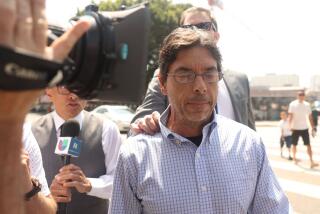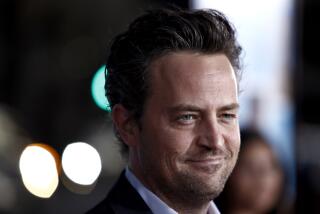Michael Jackson probably caused his own death, witness testifies
A leading anesthesiologist told jurors Friday in the trial of Michael Jackson’s personal physician that the singer probably caused his own death by injecting himself with a dose of the drug while his doctor wasn’t looking.
In his testimony, defense expert Paul White directly challenged the theory put forth by the government’s main medical witness, Dr. Steven Shafer. The prosecution expert testified that the only plausible scenario was that Dr. Conrad Murray had left a large intravenous drip of the anesthetic propofol running into the singer’s bloodstream for three hours, even after Jackson had stopped breathing.
On Friday, White said Shafer’s theory was ruled out by the level of the drug found in Jackson’s urine at autopsy. Given the urine levels and evidence at the scene, the more likely explanation was that the singer gave himself the drug, said White, one of the first U.S. researchers to study the drug.
“You think it was self-injection of propofol ... between 11:30 and 12 o’clock?” defense attorney Michael Flanagan asked.
“In my opinion, yes,” White said.
White’s statement is the first evidence the defense has put forward to support a theory they’ve argued all along: that it was Jackson, not Murray, who administered the dose of propofol that killed the pop star. Shafer testified that blood levels of the drug found at autopsy did not support self-injection, and he called that a “crazy scenario.”
White offered no defense to what several medical experts called by prosecutors have told jurors — that even if Jackson gave himself the drug, Murray was still responsible for the singer’s death for leaving him unattended. At the beginning of his testimony Thursday, he acknowledged that he could not explain away Murray’s conduct.
The concession suggested that Murray’s defense planned on admitting that the doctor made missteps but denying that he directly caused his famous patient’s death.
The anesthesiologist’s testimony also supported a second defense contention: that the singer swallowed several tablets of the sedative lorazepam. That drug, combined with the propofol they say Jackson gave himself, caused a “perfect storm” that killed the star instantly, they have told jurors.
“The fact that there is even a tiny amount of free lorazepam [in Jackson’s stomach] is consistent with the theory that he took lorazepam orally,” White said.
Flanagan asked if the drugs Murray admitted to giving Jackson in his police interview — small injections of two sedatives followed by a half dose of propofol — could have caused the singer’s death.
“Would this present a dangerous situation here?” the attorney asked.
“Not at all,” White said.
White, the final defense witness, is expected to resume his testimony Monday at the downtown Los Angeles courthouse and will be cross-examined by a prosecutor. Murray, 58, faces up to four years in prison if convicted of the involuntary manslaughter charge; he has pleaded not guilty.
More to Read
Sign up for Essential California
The most important California stories and recommendations in your inbox every morning.
You may occasionally receive promotional content from the Los Angeles Times.












